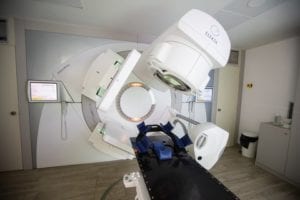Targeted Radiotherapy for Mesothelioma May Extend Survival in the Right Patients

A meta-analysis conducted by some of the country’s top cancer researchers says targeted radiotherapy for mesothelioma can help some people live longer. It is the first such analysis of targeted radiation after lung-sparing mesothelioma surgery.
The team focused on intensity modulated radiation therapy (IMRT). IMRT is more precise than earlier forms of radiation treatment.
The new article appears in Practical Radiation Oncology. It is a meta-analysis of ten smaller studies. The researchers conclude that healthier surgery patients could safely consider targeted radiotherapy for mesothelioma.
Making Radiotherapy Less Toxic
In the past, radiation for mesothelioma has sometimes done more harm than good. Earlier types of radiation treatment were not as precise as IMRT. When radiation spills over into healthy tissue, it can cause serious complications.
Because of these “severe toxicities”, radiation has not been a routine part of mesothelioma treatment. Instead, most patients have chemotherapy. If they are healthy enough, they may also undergo surgery.
But the new meta-analysis suggests targeted radiotherapy for mesothelioma after lung-sparing surgery can help some patients live longer. IMRT uses multiple small beams to direct as much radiation as possible into the mesothelioma tumor without harming the surrounding tissue.
Analyzing Targeted Radiotherapy for Mesothelioma
The authors of the new analysis found ten studies on IMRT after lung-sparing surgery. They called the post-surgery targeted radiotherapy for mesothelioma P-IMRT.
Their evaluation found that, in most studies, fewer than nine percent of patients had some lung inflammation (pneumonitis) after P-IMRT. In all but one study, only 1.5 percent of patients had serious lung inflammation. The one exception was a study where the dose was higher than 60 Gy.
In most studies, fewer than nine percent of patients had Grade 3 lung inflammation after P-IMRT. Only 1.5 percent of patients had serious lung inflammation. The one exception was a study where the dose was higher than 60 Gy.
It took more than a year for cancer to come back after targeted radiotherapy for mesothelioma. Median survival ranged from 19 to 28 months.
“P-IMRT produces relatively few higher-grade toxicities, and has reasonable disease-related outcomes, especially when delivering doses of 45-54 Gy,” writes lead author Rochal Patel, BA, from Albany Medical College.
The next stage will be a Phase III clinical trial of targeted radiotherapy for mesothelioma after lung-sparing P/D surgery. The trial will compare mesothelioma outcomes from P-IMRT with or without chemotherapy.
NRG Oncology is sponsoring the new trial, which will involve the National Cancer Institute. It is the first study of its kind.
Source:
Patel, R, “Disease-Related Outcomes and Toxicities of Intensity-Modulated Radiation Therapy Following Lung-Sparing Pleurectomy for Malignant Pleural Mesothelioma: A Systematic Review”, February 20, 2020, Practical Radiation Oncology, https://www.sciencedirect.com/science/article/abs/pii/S1879850020300424





